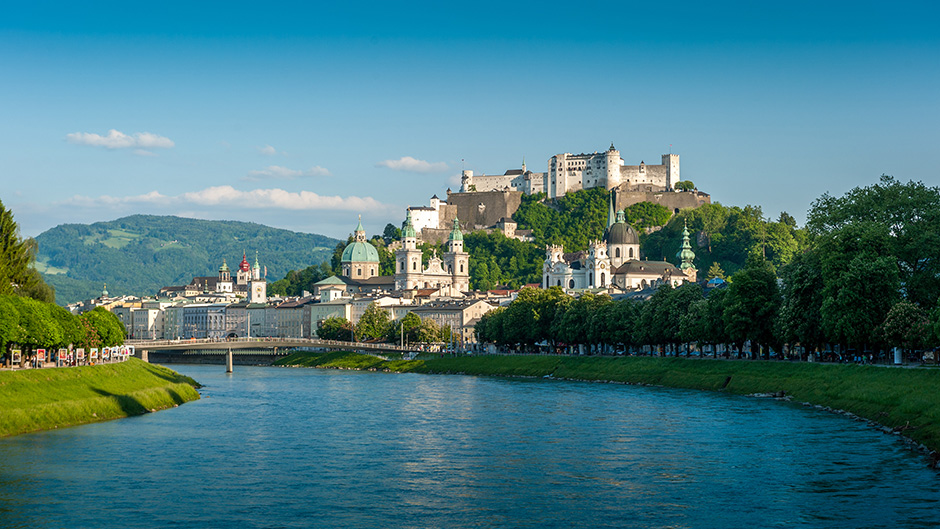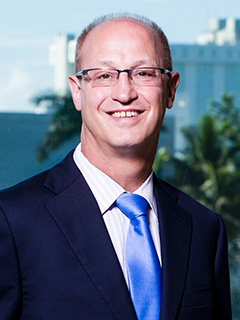 Shelly Berg, dean of the Frost School of Music, is in Salzburg, Austria, to visit students participating in the School’s six-week summer Salzburg Opera Program and the legendary Salzburg Festival in Austria. He is traveling with a group of donors to the program, who will meet with the talented singers and pianists who are participating this summer. Berg offered to blog about his musical and personal impressions of the trip for UM News.
Shelly Berg, dean of the Frost School of Music, is in Salzburg, Austria, to visit students participating in the School’s six-week summer Salzburg Opera Program and the legendary Salzburg Festival in Austria. He is traveling with a group of donors to the program, who will meet with the talented singers and pianists who are participating this summer. Berg offered to blog about his musical and personal impressions of the trip for UM News.
Wednesday, August 10, 2016
Yesterday our entourage of Frost Salzburg Program donors and I enjoyed a private tour of the Trapp Family Villa in Aigen, Austria, which is now a bed-and-breakfast style hotel operated by the Trapp Family Foundation. Its primary mission is to communicate the true story of the Trapp family, not the fictionalized version in the motion picture, The Sound of Music, which takes liberty with some aspects of their lives.
For example, the children were teens and young adults by the time of the Nazi invasion of Austria, and the events occurred over a span of 14 years, not one. While it is a lovely 22-bedroom home, it is very different than pictured in the movie, because the interior was shot on a movie set, and the exterior scenes at two different locations in Austria. Ironically, after the Trapp family left Austria, Heinrich Himmler, Hitler’s architect of the Jewish genocide, took residence in this house.
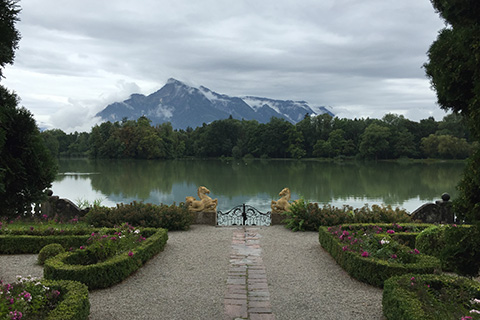 |
| Lakeside at Schloss Leopoldskron, the stately home used in the filming of the Sound of Music. |
Next we visited the Schloss Leopoldskron, a stately home that was used for The Sound of Music filming. It is a stunning estate with dramatic formal gardens leading to a lake, where in the movie Maria and the children were boating and fell into the water before meeting the baroness.
Our director of the Frost Salzburg Program, mezzo-soprano Robynne Redmon, had arranged for 11 students to perform a “Schubertiade” (an intimate performance of the songs of Franz Schubert) at the Schloss Leopoldskron! It was a first for the program, with an audience of about 75, including representatives from the U.S. Embassy. The students were clearly excited and honored to perform in this elegant and historic venue. Schubert’s Lieder (songs for voice and piano set to the words of Schubert’s contemporary poet’s, Goethe for instance) are meant to be heard in the intimacy of a salon. Schubert composed over 600 lieder in the less-than 32 years of his life.
Frost School students Neil Taibel, Emily Ennis, Cameron Sledjeski, and Joana Gonzales all participated, providing us with an opportunity to hear their musical growth over these last weeks. The event was knit together with commentary, poetry readings, and even antiphonal French horn and yodeling from the garden behind the house. Afterwards, the students and concert patrons were invited to tour the upstairs, which included a wood-paneled library with two levels of books, and a hidden staircase! There was time to stroll through the gardens, and the entire experience was an unforgettable treat.
The evening ended back at the Salzburg Festival, with a concert of Brahms’s Die schöne Magelone op. 33, a set of 15 songs inspired by stories by Tieck, featuring baritone Matthias Goerne, pianist Yuja Wang, and narrator Ulrich Matthes, a popular actor in Europe. It was performed in a large and ornate concert hall at the Mozarteum. Goerne and Wang are true titans in their respective worlds, and the audience was overwhelmed by the artistry and virtuosity they achieved. Goerne’s voice has an immense richness that is never edgy or brittle. Wang is one of the world’s greatest technical virtuosos, but as with Goerne, we hear the music in her playing, not the technique. The music of Brahms is not only beautiful and complex, but much more difficult to perform than it sounds. Last night’s artists made it seem effortless and seamless. The Frost Salzburg students were in attendance, and they were able to witness the pinnacle that is achieved when musical talent and years of intense practice are combined. A recital like this is often a catalytic event for an aspiring musician.
Today the students in the Frost Salzburg Program completed their six weeks of study abroad with a final concert at the Augustiner Brewery. All 35 students performed in this lengthy but wonderful recital, with a repertoire encompassing lieder, oratorio and arias. Some of the young women wore traditional Austrian “dirndls,” completing their transition into local culture. The teacher’s were noticeably proud, and the students were supportive and raucous in their applause for each other. A reception followed with excellent biergarten cuisine. I had a chance to speak with many of the students, each of whom was excited to return home to share her/his progress with professors and peers. The final moments evolved into a jam session, as Frost Salzburg students “sat in” with a local bluegrass band!
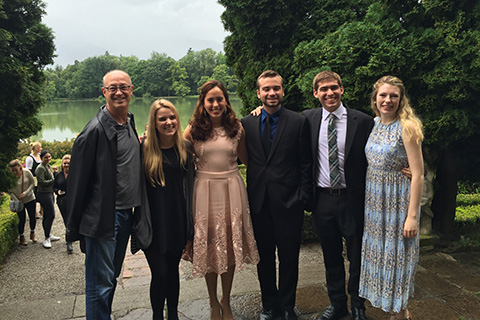 |
| Frost School Dean Shelly Berg, left, with students in the Salzburg study abroad program. |
I can’t be more proud of the Frost Salzburg Program. Frost Professor Robynne Redmon and her peers exceed students’ expectations in delivering on the mission of professional training and cultural immersion. For six weeks each summer, The Frost School has a prominent position in Salzburg during the Salzburg Festival. As I wrote before, this is the epicenter of classical music in July and August, and our imprint here is fantastic for both the Frost School and the University of Miami. I would love to return next year, and I hope to be accompanied by another great group of supporters.
Auf Wierdersehn!
Monday, August 8, 2016
Being in Salzburg can have a life-altering affect for an American visitor. Even with cars and electricity, the city seems very much as it would have a few hundred years ago. You can’t turn in any direction without a vista filled by a magnificent church or castle on a hillside. People congregate at cafes and beer gardens in the many town squares, as they did in centuries past. All too often, the Americans have their faces buried in smart phones, while their European counterparts are engaged in lively conversations.
Today, I visited the Frost Salzburg Program in action. Students and faculty come from not only the Frost School, but also other institutions around the world. I observed lessons given by faculty members Clifford Billions of the Cleveland institute, and Peter Atherton of Chapman College. Teaching expertise and compassion were on display in both venues. The students are very talented, but there are real impediments to achieving their artistic goals. It was fascinating to watch each professor break vocal, language, and stylistic problems into bite-size and curable solutions. These six weeks of immersive study foster an impressive growth, noticeable to both students and faculty. The distinguished faculty artists have taught at other summer institutes, and I am proud to say they all feel that the Frost Program delivers on its mission better than any of the others.
Lunch was spent with the students and faculty at a lovely restaurant, Nestroy, only a few steps from the school. They eat here each day as part of the tuition plan, with food that is excellent and characteristically Austrian.
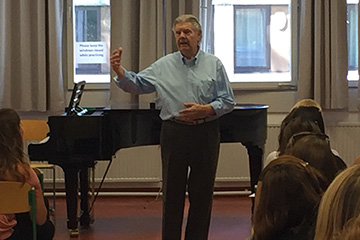 |
| Richard Owens, former director of the Orlando Opera, was a guest lecturer in the Frost Opera Program in Salzburg. |
The afternoon featured a master class by a guest lecturer, Richard Owens. Owens founded the famed AIMS Institute in Graz, Austria, was once director of the Orlando Opera, and has been involved as both singer, and singers’ agent, for decades. The Salzburg Festival is an annual magnet for the illuminati of opera and the musical world, and the Frost Program is able to tap into this pool for regular master classes. The Owens session was fascinating and enlightening. His comments to each singer steered clear of vocal technique, so as not to be contradictory to their daily instruction. Instead, he peeled back the many layers of understanding that artists must pursue in order to become masters. His questions and commentary delved into subtext, symbolism, history, language, culture, and irony, all leading to a contextual awareness that musical mastery requires. This afternoon was a true eye-opener, and will forever change the perspective of these young artists.
Monday night provided a piece de resistance! We were treated to an evening like no other at the home of noted Mozart Scholar, Josef Wallnig. Professor Wallnig and his wife, Ina, live on two floors of a six hundred year old house in the middle of Salzburg’s old city. His home was also the home of Mozart’s widow Constanze and her second husband, and was the venue for their writing of Mozart’s biography. After refreshments and light conversation, we were escorted to the building’s roof for a spectacular view of Salzburg and its surrounding.
What followed was an engaging salon recital, much as Mozart would have enjoyed in the 18th century. Paul Wyse and Francois Germain, of the Crane School of Music, are two brilliant piano faculty in the Frost Salzburg Program. They opened the recital with a movement of a Mozart sonata for four hands, and in a nod to Miami closed the evening with a breathtaking rendition of the last movement of Ravel’s Rhapsodie Espagnole. Ivan Jukic, an extremely gifted tenor in the program, enthralled our small group with a Massenet aria. Herr Wallnig then passed out toy instruments, including a cuckoo whistle, bird whistles and various toy percussion implements.
Seated at the piano and playing a kazoo-like toy, Wallnig led us through a humorous selection composed by a Mozart contemporary, explaining that Mozart loved this kind of party game. Even I was pressed into service at the piano, when Frost Professor Robynne Redmon (Director of our Salzburg Institute) suggested I improvise a set of variations to a Mozart theme.
There are grand and glorious concert halls throughout the world, and they provide wonderful cultural experiences to millions of music lovers. But, it is important to remember the salon and the intimate and unifying musical experience that can’t be replicated in the less personal setting of a concert hall. Another day . . . another Salzburg lesson.
Sunday, August 7, 2016
Today I took an all-day excursion with two UM Frost students and about a dozen supporters of the Frost Salzburg Program to the Salzkammergut, a lake district in the Austrian Alps about half an hour away from Salzburg. It is a truly breathtaking holiday mecca for locals who enjoy bike riding, hiking, boating, sun bathing in the summer, and skiing in the winter.
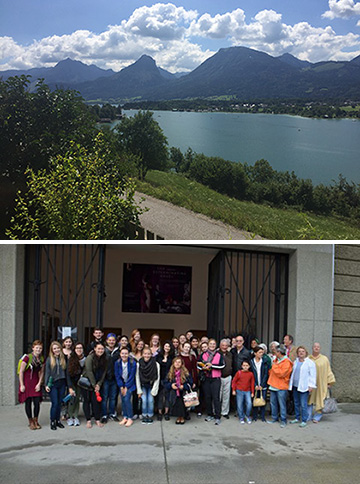 |
| (Top photo) A view of the Salzkammergut, a lake district outside of Salzburg. (Bottom photo) Students and donors involved with the Frost School of Music’s Salzburg Music Program. |
We began our journey at the port of St. Wolfgang, on the Wolgangsee, a large expanse of clear, mountain-fed drinking-quality water. As we arrived in the mid-morning, a community concert band, with musicians from middles school age to adult was rehearsing in the town’s band shell. Their renditions of Bavarian marches reminded me of music’s binding power across generations. We once had more of this tradition in the U.S., and I miss it. We boarded an old paddlewheel boat and slowly made our way over to the town of St. Gilgen, where horse-drawn carriages transported our group to an a old farmhouse in the foothills. There we enjoyed a panoramic view, and a light lunch of cheese and traditional cold cuts…including venison salami. Our tour guide, Lucas Stockinged, showed us how Austrians enjoy drinking water with a splash of elderberry juice - very refreshing.
I asked the UM Frost students who joined us for the outing to make a few remarks about how the Frost Salzburg Program had benefitted them, and they were effusive. Joanna Gonzalez, an undergraduate pianist who studies with Santiago Rodriguez at Frost, said that performing here has pushed her out of “solo piano mode” as she accompanies singers in the program both in practice and in master classes almost daily. “Ensemble training is good for everyone. You learn that the music is about the music, and not about you,” she says, and credits the Frost School’s Experiential Music Curriculum with giving her the comprehensive skills to become “adaptable to different scenarios, and be very flexible in music.” Singer Cameron Sledjeski said his opportunity to sing with the professional orchestra Saturday in the Mozarteum was “a really big deal, and a real privilege. It will be great for my resume!” He praised the great tickets the students receive to major concerts at the festival, the daily immersion in the Austrian culture, profound music lessons, diction coaching, master classes with major singers, lunch every day with all of the students and faculty, and glorious sightseeing and tours.
We returned to Salzburg in time for a fantastic Salzburg Festival concert with Zubin Mehta conducting the Vienna Philharmonic at the Grosses Festpielhaus. Students, faculty, and donors on our trip had incredible orchestra seating in the first five rows. The Salzburg College helps administer the study abroad logistics for University of Miami Frost School of Music’s Salzburg Music Program, and one of the benefits of this partnership is access to great tickets to Salzburg Music Festival events, something other summer abroad music programs rarely can provide.
Mehta was a commanding and intuitive leader for this great orchestra, with a sound characterized by very rich timbres in both strings and brass. The second half of the concert was a tour de force rendition of Anton Bruckner’s Symphony No. 4, a massive 75-minute work. The performance was deeply moving as it was conducted and performed with a range of emotion, technical virtuosity, dynamic and textural nuance. In addition to the stunning music itself, it was interesting to observe the Vienna Philharmonic’s staging traditions. For example, right before it was time to perform, the entire orchestra walked on stage and took a bow. They tuned and warmed up back stage, so the first sounds that we heard were the first notes of the concert - a dramatic effect that left me wondering why orchestras in North America ‘noodle’ on stage before the concert begins? I also appreciated that, like other concerts I’ve attended throughout Europe, the house lights were not turned down low, so the audience remained engaged with the orchestra; very few people were nodding off, even after a three-and-a-half hour concert.
It was a memorable day in all respects, and I can’t wait for tomorrow when I’ll have a chance to observe our students in their lessons and an afternoon master class, followed by an evening with a Mozart scholar… who today lives in the same apartment where Wolfgang Mozart’s widow, Constanze made her home!
Saturday, August 6, 2016
I arrived yesterday evening in Salzburg, Austria under a thick cloud of fog. The tall mountains were barely visible as my taxi made its way from the airport to the charming city that has hosted the Salzburg Music Festival since 1926.
I joined our donors, Assistant Professor Robynne Redmon and the other vocal and piano faculty who are teaching at UM’s Salzburg Opera Program this year, for a charming dinner at the Stifskeller St. Peter, which I am told is the oldest restaurant in Europe! While enjoying a delicious traditional meal of beef consume soup followed by schnitzel and boiled potatoes, I learned there are 38 students studying abroad this summer in our program, hailing from the University of Miami Frost School of Music, The Cleveland Institute, Chapman College, McGill University, Loyola Marymount, and more.
It was still drizzling Saturday morning as we all met at 8:30 a.m. for a tour of the Salzburg Efestspielhauser, an impressive conglomerate of three opera houses that host over 200 opera, concert and theater events for 260,000 visitors each festival season. Since Salzburg is the birthplace of Mozart, they naturally present his operatic works, along with others from the traditional canon, and new works. Of particular excitement to the students was to enter the largest festival hall that was originally a stone quarry, carved into a horse stable and theater to parade horses for the monarchy of the time. The cavernous space was adopted by the festival for large-scale operas, but today is probably best recognized as the setting for the Trapp Family’s ‘farewell’ scene in The Sound of Music. It was a thrill to see it, and realize the impact the movie, and its music, has made on generations since.
Afterward, Emily Ennis, rising junior vocal performance major at UM Frost, expressed her enthusiasm for the entire six-week program and how her study abroad experience here has broadened her world-view. “In Salzburg, opera and classical music is a lifestyle, whereas in the U.S. it is viewed more as an art form…something to be studied. Here, music and art is valued tremendously. It feels like the lifestyle in music that I aspire to have.” In addition to private voice lessons and repertoire coaching, she takes daily German lessons, and has enjoyed many social outings with others in the program to practice the language. She’ll perform in a Schubert concert on Sunday, and I’m looking forward to hearing how her singing and diction has progressed this summer.
Another young vocalist, 18-year-old Canadian Olivia Charette who is entering McGill University as a music major this fall, share’s Ennis’s view. “At home, singing seems more technical. Here it becomes 3-D, it comes alive! I’m getting a glimpse into how the professional world works, how the staging is done, how collaborative it is. The singers who give master classes share the journeys that they’ve made – it is inspiring. I just decided this week that I definitely want to become a professional opera singer. This program has opened up all aspects for me.”
Next was a tour of the DomQuartier, an amazing cathedral and residence built over 400 years ago for Salzburg’s prince-archbishops, and the site of Mozart’s first recital in the town of his birth, when he was six years old! As the sun began to peek out from behind the clouds, the jewel-like city revealed itself. From numerous tree-shaded beer gardens that have been in existence since the 1500s, to sparkling shop windows displaying traditional Austrian clothing and Mozart-themed chocolates, I enjoyed taking it all in. The sound of a brass quintet rose from the steps of a nearby church, and almost on cue, the church bells began to toll with a deep and rich resonance that made me feel, too, that music imbues the culture at every turn. It’s one of the reasons I love Miami, another place where music is all around, reflecting the melting pot of cultures that also attracts thousands to its shores.
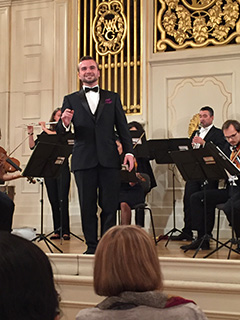 |
| Cameron Sledjeskiy, a rising junior, performs in Salzburg |
The day ended with a Frost/Salzburg first - a thrilling “all Mozart” concert in the Mozarteum, featuring select students in our summer program as soloists with the Salzburg Orchestra Soloists (SAOS), a chamber orchestra of leading members of the Salzburg Mozarteum Orchesra, The Camerata Salzburg, and other major orchestras in the region. The SAOS performs Mozart’s works with characteristic sound and style, great musicality, and verve. My personal highlight was to see and hear our rising junior, Cameron Sledjeskiy, a baritone in the Department of Vocal Performance at the Frost School, “rock it” on Mozart’s demanding and virtuosic aria “Auf zu dem Feste” (“On to the Feast”) from the comic opera Don Giovanni.
It was a great day in one of the world’s cradles of musical genius, and it filled me with pride to know that we incubate a special and transformative immersion for the gifted students of the Frost Salzburg Program.
Friday, August 5, 2016
I’m making my way to Salzburg, Austria, a charming city nestled high in the Alps, and the birthplace of Wolfgang Amadeus Mozart, to visit the Frost School of Music’s Salzburg Opera Program, founded by my predecessor Dean Emeritus Bill Hipp over 30 years ago. It has progressed into one of the world’s most respected summer opera programs for aspiring professional singers, and I’m eager to take it all in for the very first time.
Now under the leadership of Assistant Professor Robynne Redmon, an acclaimed mezzo-soprano who maintains a robust professional schedule and full private teaching load during the academic year, the program has grown to include in-depth master classes, private lessons, concerts with live orchestra, and lectures with opera singers, music scholars, and conductors.
Over a dozen donors to the Frost School’s program will be joining me, Robynne, and the students on Saturday morning for a tour of the Salzburger Festspielhäuser, and the DomQuartier, followed by a two-hour master class with Luca Pisaroni, a featured artist in Mozart’s Don Giovanni at the Salzburg Festival. Our opera students will then perform a concert with a professional orchestra on Saturday night!
On Sunday we’ll be heading to the Salzkammergut (Lake District) where we’ll visit the charming town of Mondsee and the site of the church used for the wedding scene in The Sound of Music. On Tuesday our students will be performing at the beautiful Leopoldskron estate, which was used for the interior ballroom and outdoor lake scenes in the movie.
What a start to a full week of amazing study abroad activities! I took a group of university students to Salzburg about 25 years ago, early in my career, and I can’t wait to return and share its magic with our donors and all of our summer opera students and hard-working faculty.
Stay tuned for more!
